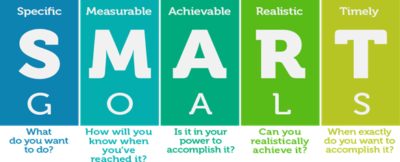
With this new year of 2020 brings a new decade. New years often means the rise of “New Year’s Resolutions” that are often well-intended, but not well executed. A vast majority of those who form New Year’s Resolutions do not keep their promises to themselves, usually due to a lack of structure and realism with their goals. They will always have an excellent start, but if they have built on weaker foundations, the house will not stand.
SMART goals change the way people tackle not only fitness goals, but any goals in life! If you have never heard of SMART goals, it is a method developed to increase goal-setting behavior and adherence. Each letter in the acronym, S.M.A.R.T, represents a different aspect of the goal to keep in mind. Specific. Measurable. Attainable/Achievable. Relevant. Timely.
This method will encourage you to be honest, be dedicated, challenge yourself, and witness the results of your hard work.
Here’s an example: Hannah, a working post-graduate student during her gap year, wants to commit herself to be “more healthy” this year by exercising more/going to the gym more. This is a good start; however, let’s see if we can turn Hannah’s intentions into a reality!
Specific
Specificity breeds effectiveness and efficiency. The more specific one can be with their goals, the path to achieving that goal will become more apparent. This step requires asking more detailed questions about your goal:
-What needs to be achieved?
-Who is the goal benefiting?
-What are the steps you need to take to get there?
By keeping these things in mind, you are one step closer to achieving a more specific goal, and you will know how to get there.
Hannah’s example: “I want to be healthier this year by exercising more often. I will go to my local gym 3-5 times a week before work.”
Measurable
Being specific is only one portion of the journey. To achieve your goals, you have to be able to track your process. Your goals must be measurable, with numbers. Tracking yourself keeps you accountable and reminds you of how much progress you have made!
-How can I measure this goal?
-What will I use to measure this goal? An app? A journal?
-How can I reward myself with the progress I made? How can I motivate myself if I am behind?
Hannah’s example: “I will log my gym sessions on the MyFitnessPal app, and see how many times I go to the gym each week. If I go three times a week for the first three weeks, I will reward myself with a cute new sports bra, then start going four times a week. ”
Achievable
This section serves as a reality check and requires a fair amount of brute honesty. Making resolutions, goals, deadlines means that these goals have to be completed, by YOU. Most goals should not be ridiculously unobtainable ideas that fail from the start. Keep in mind these questions as you examine your goals:
-Can I achieve this?
-Does this make sense?
-What will be potential obstacles/limitations that I will have to accommodate and overcome?
Hannah’s example: She needs to keep in mind if going to the gym will be more effective before work or after work. “Would it make more sense to be more strict about going at least three times a week for 2-3 weeks, then increasing the number of sessions or being more flexible depending on the workload/life events?”
Relevant
Relevance is examining the benefit and significance of the goal. The relevant part of SMART is the “why?” portion of setting your objective.
– Why am I doing this?
-Why is this goal so important to me?
-What are the benefits of achieving this goal?
Hannah’s example: “I’m doing this because I need to make fitness more of a priority in my life. High blood pressure and cholesterol run in my family, and I want to be proactive in keeping myself healthy. Plus, if my body becomes more toned, that’s another win!”
Timely
Time waits for no one. Goals need deadlines, and you need to see if you can achieve them promptly. Certain goals have more prolonged periods involved. Others need to be accomplished sooner. Keep in mind what your overarching goals are, and if needed, break down larger goals into smaller ones to keep yourself on track.
Hannah’s example: “By the end of January, I want to see that I have logged at LEAST 12 gym sessions and reflect/prepare for the next months to come. By the end of March, I would like to see myself logging five gym sessions a week.”
Photo by Clark Tibbs on Unsplash
Now that you know how to create SMART goals, achieve them! Be sure to write them down, check-in with yourself, and celebrate the victories (small and large) along the way! Keep us posted with your SMART goals on the Fitzness Facebook page or in the Hottie Body Fitzness Challenge group!






